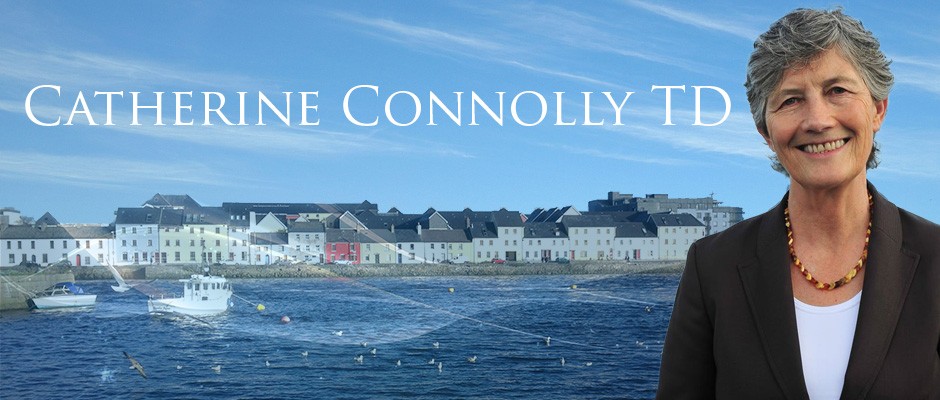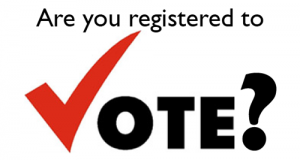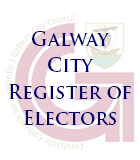15th May 2018-Press Release: Deputy Catherine Connolly calls for the Repeal of the 8th Amendment.
Deputy Catherine Connolly said that she will be voting Yes for the Repeal of the 8th Amendment in the forthcoming referendum on Friday the 25th of May. It is an issue she has campaigned for over the years and indeed since her election in February, 2016 she has spoken in the Dáil on many occasions and also addressed public meetings on the subject.
Deputy Connolly said that the 8th Amendment was inserted into the Constitution in 1983 in a misguided attempt to bring certainty to a situation where certainty could not apply and where it was known at the time that the Amendment would cause serious problems for women.
More particularly, the then Attorney General, Peter Sutherland advised strongly against the insertion of the 8th Amendment into the Constitution. In fact, so strong was his advice that the unusual step was taken to publish his opinion including his decision not to approve the wording proposed.
Amongst other concerns, he pointed out that the proposed wording was ambiguous and unsatisfactory, that it would lead inevitably to confusion and uncertainty on the part of the medical profession and also the lawyers and the judges who would have to interpret it. He went further and said having regard to the equal rights of the unborn and the mother, a doctor faced with the dilemma of saving the life of the mother, knowing that to do so will terminate the life of the unborn will be compelled by the wording to conclude that he can do nothing.
Unfortunately, his advice was not heeded at the time and the problems highlighted by the then Attorney General became all too evident in the many cases which came before the Courts in Ireland, in the European Courts and in the various hearings before UN Human Rights Committees in the ensuing years, right up to the very recent case of Siobhán Whelan in June 2017 when the United Nations Human Rights Committee ruled for the second time that Ireland’s abortion laws subjected a woman to cruel, inhuman and degrading treatment. Again Ms Whelan was denied access to abortion services in Ireland following a diagnosis of fatal foetal impairment.
Previous cases involved women and children who were brought before the Courts by the State and/or women and children who were forced to go to Court because of the actions of the State due to the detrimental effects of the 8th Amendment.
Deputy Connolly said that it is quite clear from the individual circumstances of all of these cases that the 8th Amendment is not fit for purpose and has actually caused great distress and upset to women, affected their health and actually led to loss of women’s life.
She said no one could read the individual facts of each of the cases that have come before the Courts on a continuous basis since 1983 up to the present day and not be deeply affected at how far the intrusive tentacles of the 8th Amendment have reached into the lives and health of both young girls and women: including effecting the right to travel and to obtain information about abortions in other countries, the right to make a decision about childbirth and the right to die with dignity.
For example she said in the case now known as the X case and which the country learned of in 1992, the State sought to prevent a young fourteen year old girl who was pregnant consequent on a brutal rape, from travelling to England for a termination. This young traumatised girl had to endure the subsequent trauma of both a High Court and a Supreme Court Case before she was allowed a termination and only then because the Supreme Court accepted that her life was at risk because of suicide.
Six years later in 1998, another young girl, this time 13 years old and again pregnant as a result of rape, in a case known as the A&B v Eastern Health Board and others, had again to await the decision of a High Court before being allowed a termination in Ireland in a situation where the Court accepted there was a real and substantial risk to her young life because of suicide.
That once again a traumatised thirteen-year-old girl, pregnant through rape should have to endure District and High Court proceedings to access what the Courts accepted was the required medical treatment was unconscionable. Yet the appalling circumstances of this young girl and what she had to go through did not serve as a catalyst for a change and unfortunately the cases kept coming before the Courts.
In 2007 for example, the Miss D Case revealed the extent of the actions a state body was prepared to take to control a woman’s life pursuant to its interpretation of the 8th Amendment. This time a seventeen-year-old with an anencephalic pregnancy and under the care of the HSE found herself before the courts having failed to obtain the HSE’s permission to travel abroad to obtain a termination. Not satisfied with the young woman’s refusal to say she was suicidal in order to obtain that abortion in Ireland, the HSE wrote to the Garda Síochána to request that they arrest Miss D if she attempted to leave the jurisdiction. They also requested the Passport Office to refuse to issue her with a passport. Miss D was obliged to bring High Court proceedings against the HSE to allow her to travel.
In other cases, women were obliged to go to European Court of Human Rights to access justice as in the 2010 case known as: A, B and C v Ireland, ten years into the 21st Century!
The European Court of Human Right’s finding in favour of Miss C gave a woman called Michelle Harte the courage to come forward and tell her story. In 2010 she had become unintentionally pregnant while suffering from a malignant melanoma. Although advised by her Doctors at Cork University Hospital to have a termination because of a risk to her health, this was denied by the hospital following a decision of an ad hoc ethics committee. Michelle Harte had to travel to the UK for an abortion while severely ill and had to be assisted onto the plane. Again the government was forced to settle her case on the basis of the previous European Court of Human Rights decision in the A, B and C case v Ireland. Miss Harte died from cancer in 2011.
It took the death of another woman which we are now only too familiar with in Galway however for the government to begin the process of bringing in the legislation required since 1983.
On the 28th October 2012, Savita Halappanavar, a 31-year-old woman who was 17 weeks pregnant, died in our Hospital in Galway in circumstances where she was refused a termination during an inevitable miscarriage because a foetal heart beat was detectable. The subsequent independent report into her death, amongst other findings found an over-emphasis on the need not to intervene until the foetal hear stopped, together with under-emphasis on managing the risk of infection.
The following year, in July 2013, the Protection of Life during Pregnancy Act 2013 was finally enacted and became law on 1st January 2014 to allow for terminations only where a pregnant woman’s life is at risk, including the risk of suicide.
The enactment of this piece of legislation had taken 31 years by which time it had become abundantly clear that both the 8th Amendment and the legislation itself which criminalises women and includes a prison sentence of up to 14 years for having an abortion and/or or helping a woman to have an abortion was not just fit for purpose but is actually detrimental to women’s lives, health and freedom.
At the same time, women continue to make decisions as best they can in the shadow of a legal system that both criminalises and disempowers them while removing their voices completely from the decision making process. It also completely denies their reality and equally worrying excludes them from the health care service. Indeed every year at least 3,265 Irish women travel to the UK for abortions with an unknown number travelling to other countries. In addition, it is now known that there are approximately 3,000 requests for abortion pills from Ireland both North and South every year from providers in the UK.
There is absolutely no doubt in my mind that more and more women will be taken to Court by the State and/or forced to take proceedings themselves in the most traumatic of circumstances as long as the 8th Amendment remains part of our Constitutions. Seventy years after Ireland passed the Republic of Ireland Act, 1948, by which it would declare itself a republic the following year, it is time to remove the 8th Amendment from the Constitution and place the pregnant woman at the centre of a rights-based process. A process that will enable and empower her to meet the challenges posed in any given pregnancy and to make her own informed decisions as the best way forward.
For all of these reasons and many more, I will be voting yes in the forthcoming referendum on Friday the 25th May, 2018.



